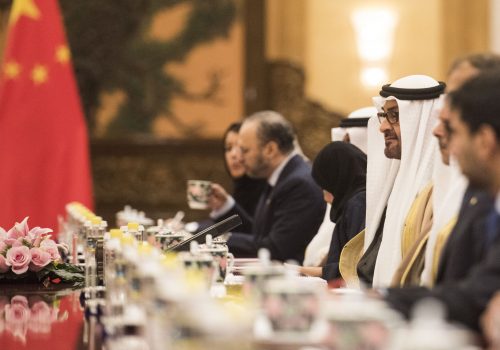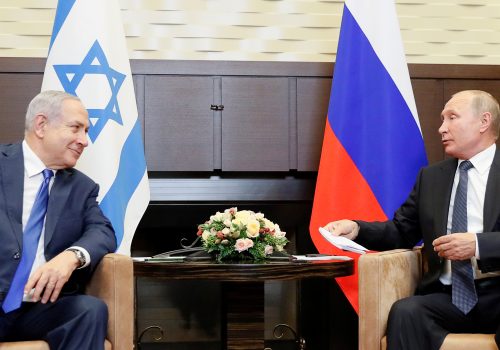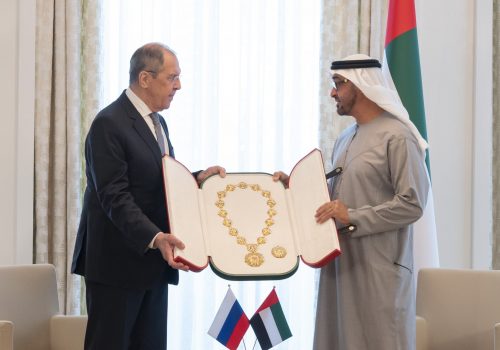US-Russia summit: Much ado about nothing in the Middle East
This article is part of a strategic collaboration launched by the Atlantic Council (Washington, DC), the Emirates Policy Center (Abu Dhabi), and the Institute for National Security Studies (Tel Aviv). The authors are associated with the initiative’s Working Group on Chinese and Russian Power Projection in the Middle East. The views expressed by the authors are theirs and not their institutions’.
MENA and the US-Russia Summit: Behind the scenes messaging or setting the guardrails for “strategic stability”?
On June 16, the US-Russia summit took place after US President Joe Biden’s apparent effort to revitalize the transatlantic alliance and the Atlantic Charter at the NATO Summit. This push was prompted by an increasing focus by the US on Great Power competition, mainly in regard to China but also with Russia. The US commitment to NATO’s Article 5, known as Collective Defense, was described by Biden as “rock solid and unshakable—a sacred commitment” during his speech on June 14.
Biden’s comments to “Verify, then trust” may also be something to keep in mind and are applicable across the board as he deals with autocrats like Russian President Vladimir Putin and tries the diplomatic track with Russia. “Strategic Stability” has been described by Kremlin spokesman Dmitry Peskov as the most important subject of the summit—a phrase also used by none other than US National Security Advisor Jake Sullivan. While the bar was low before the summit and the outcomes met most expectations, it simply served to establish the hopes of any guardrails for a working relationship with Moscow—although with little indication of any Putin-Biden chemistry in front of the cameras.
Russia’s influence and projection in the Middle East was expected to be a main topic on the agenda, which was also likely to reaffirm Russia’s status—and Putin’s ego—as level with the US and part of the Grand League of powers. The focus on the Middle East was limited, with Afghanistan, Iran, Syria, and Libya being matters about which the two leaders briefly exchanged views. Russian Foreign Minister Sergey Lavrov added recently that, “We are not setting our expectations high, nor do we entertain any illusions about potential ‘breakthroughs,’” making clear since the start that the tone for this meeting was to lay out the cards first and allow the US to set the hopes for a reset and a working relationship with Russia.
There are several areas where limited progress can be made post-summit, especially as it concerns Syria, which received the most attention from the MENA region. As more countries from the Arab world think about normalizing relations with the Bashar al-Assad regime, it remains to be seen if Biden uses this opportunity after the summit to build on a clear—or predictable—strategy with Russia, despite the many differences. Although any negotiations are likely to be challenging, the chances of improved communications to achieve “strategic stability” and predictability are slim but legit reasons for optimism. However, in addition to receiving no commitment from Putin to renew United Nations Security Council Resolution 2533, which authorizes cross-border humanitarian operations from Turkey, Jordan, and Iraq to different parts of Syria outside of Assad’s control, Biden predicted that it could be up to six months to a year to see “whether or not we actually have a strategic dialogue that matters.”
After all, the summit was “about how we move from here” and “practical, straightforward, no-nonsense decisions that we have to make or not make.”
In this brief reaction piece, two experts from our working group on Chinese and Russian power projection in the Middle East offer their views on the potential implications of the summit for the Middle East. The perspectives presented below make clear that no major breakthrough was expected after the Biden-Putin summit and that the low bar was indeed more about engaging than yielding any immediate results. However, the summit may have served the purpose of boosting Russia’s messaging around its influence with factions in Israel, Iran, Lebanon, Palestine, and elsewhere, which also reminds Biden of Russia’s perceived role as an equal player to the US in the “Great Power League.” Putin is likely to take this summit as a confidence-building measure for Great Power status where the stage-setting—the summit—may matter more than the actual substance.
Bolstering Russia’s claims: A global power with reach beyond the ‘near abroad’ and Syria?
Putin can be expected to have talked up Russia’s influence in the Middle East during his meeting with Biden for a couple of reasons. First, to bolster Russia’s claim as a global power with a reach beyond the “post-Soviet space” and Syria. The between-the-lines script of Biden’s visit to Europe was about how to deal with China, with Russia generally mentioned as an after-thought. Playing up Russia’s credentials with factions in Israel, Iran, Lebanon, Palestine, and elsewhere may remind Biden not to ignore Russia. Second, playing up Russia’s power and interests in the region could conceivably manipulate the US to remain in Afghanistan. This is because the US might decamp to bases in Central Asia—traditionally regarded as Russia’s soft underbelly—which would be an unwelcome outcome as far as the Kremlin is concerned.
At the same time, there is good reason to assume that Putin may have signaled to Biden that he can be reasonable and not simply a spoiler or “killer”. A case in point being his pre-summit dismissal of Russia’s ‘leaked’ plan to supply Iran with an advanced spy satellite as “garbage” and the post-summit revelations that routine diplomatic relations will be restored with the return of ambassadors. The aim, in this case, may be to drive more of a wedge between Washington and its European-NATO allies in order to scupper any newfound transatlantic unity in dealing with Russia and China.
Dr. Li-Chen Sim is an assistant professor at Khalifa University in the United Arab Emirates.
A focus on the European security architecture: No major breakthrough will happen in the Middle East.
No major breakthrough is going to happen in the Middle East following the Biden-Putin summit. Although the Iranian nuclear file and the humanitarian situation in Syria—and possibly other regional conflicts—were raised during the meeting, they do not seem to be the focus of the Russian-US agenda, which is centered around the European security architecture, “strategic stability,” noninterference in domestic politics, and Great Power Competition. Biden is yet to develop a coherent policy on most Middle East issues and a lack of mutual confidence does not substantiate new agreements.
President Biden’s whole European journey was about reassuring NATO and EU allies and closing the Russian and Chinese threat gaps. Putting himself and the Russian president on equal standing and staging the meeting, reminiscent of the famous Soviet-US summits during the Cold War, is perceived as an important confidence-building measure for Putin in Washington. Biden expects to see the change in Russian behavior over a three-to-six-month period.
Agreeing on a new negotiation channel is exactly what Putin had sought, having had no illusions about the future of the US-Russian relationship. More detailed discussions were deemed unnecessary in Geneva and left for the diplomats. The Russians were not ready for reconciliatory gestures, as that might have been misread for weakness. They will continue their support for the Assad regime in Syria and deny new humanitarian corridors not under the regime’s control without meaningful quid-pro-quo from Washington. Putin has little to deliver on the Iran talks in Vienna and no serious discussion about the Israeli-Palestinian issue is possible before the new Israeli government gets some mileage.
The separate press events by the two presidents showed the deep distrust and unbridgeable differences on core issues, but also emphasized the will to explore the possibilities for agreements where there is a convergence of common interests. Israel should help them on this exploratory mission—despite the visible obstacles ahead—focusing on the situation in Syria. The Great Power Competition will continue to be projected into the Middle East, but if Putin and Biden succeed in rehabilitating communication channels, its regional impact might be softened.
Lt. Col. (ret.) Daniel Rakov is a research fellow at the Institute for National Security Studies in Tel Aviv, focusing mainly on Russian Policy in the Middle East and Great Power Competition in the region.
Joze Pelayo organized this article and authored the introduction. Joze is a program assistant at the Scowcroft Middle East Security Initiative/Middle East Programs. Follow him on Twitter: @jozemrpelayo.
Image: JUNE 16, 2021: US President Joe Biden (L) and Russia's President Vladimir Putin (R) meet for talks at the Villa La Grange. Mikhail Metzel/TASS.No


